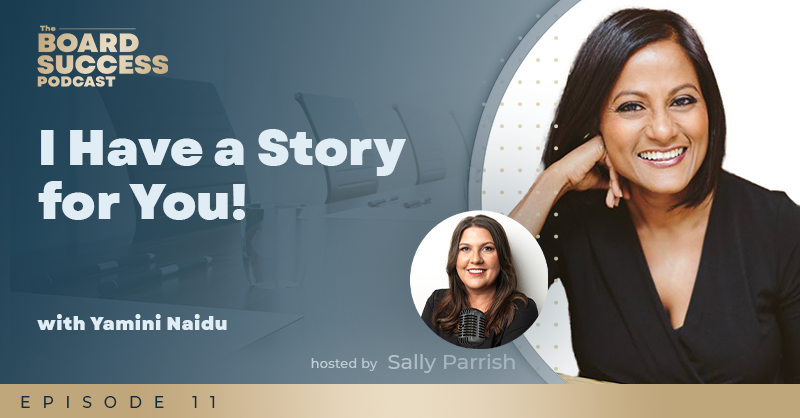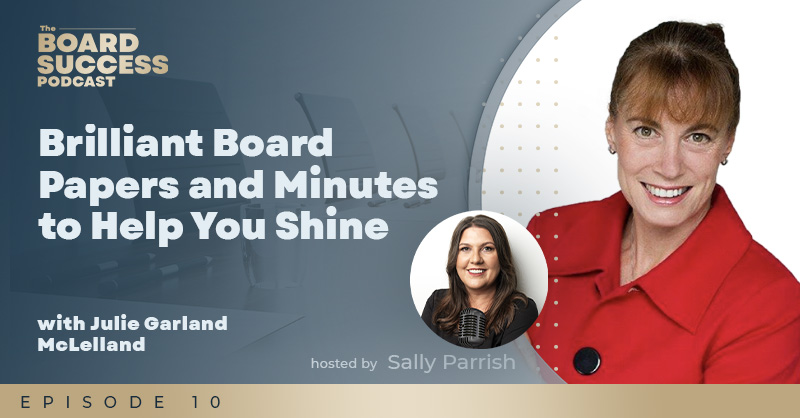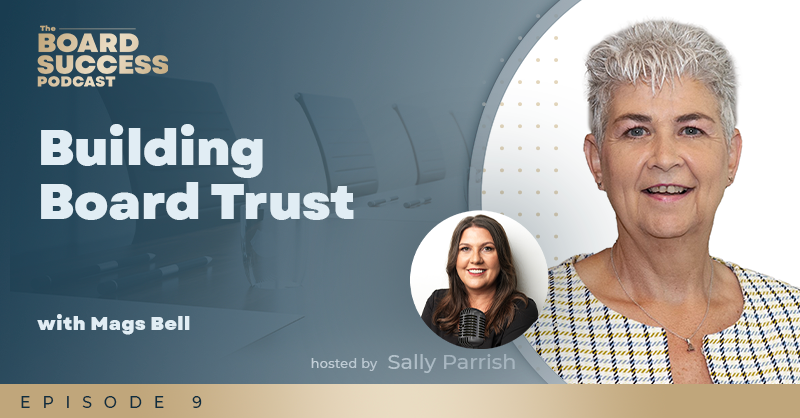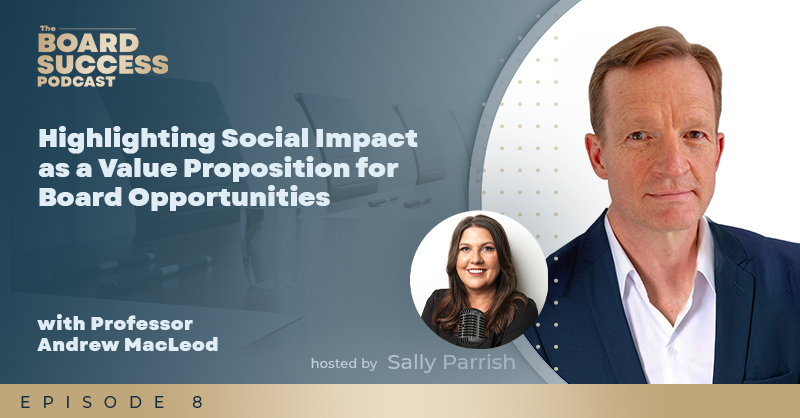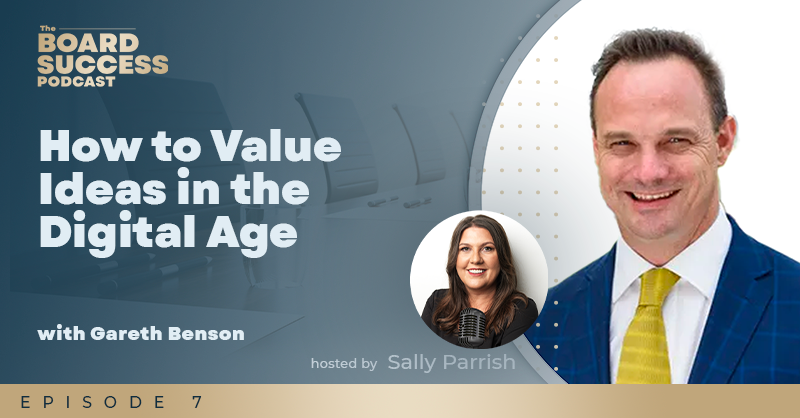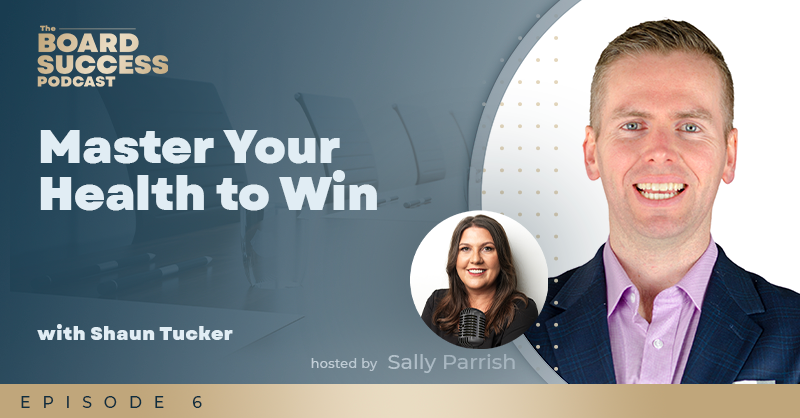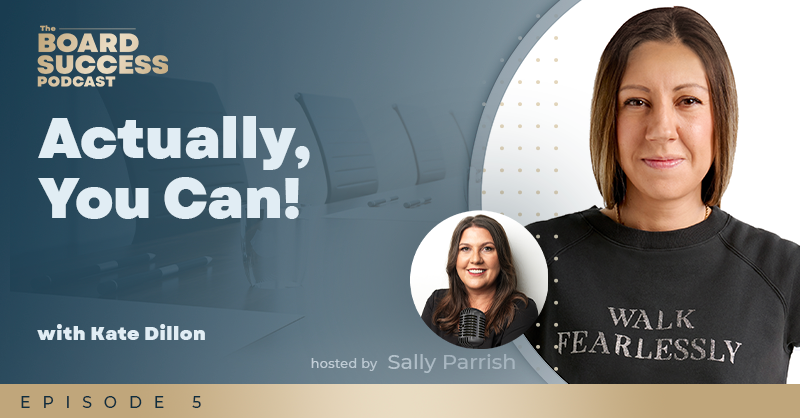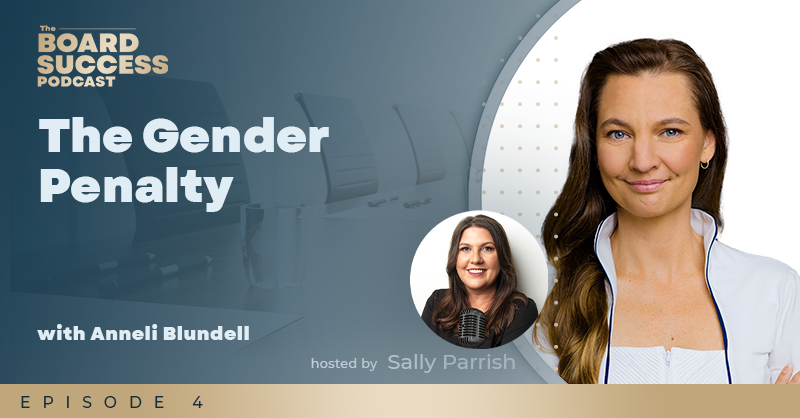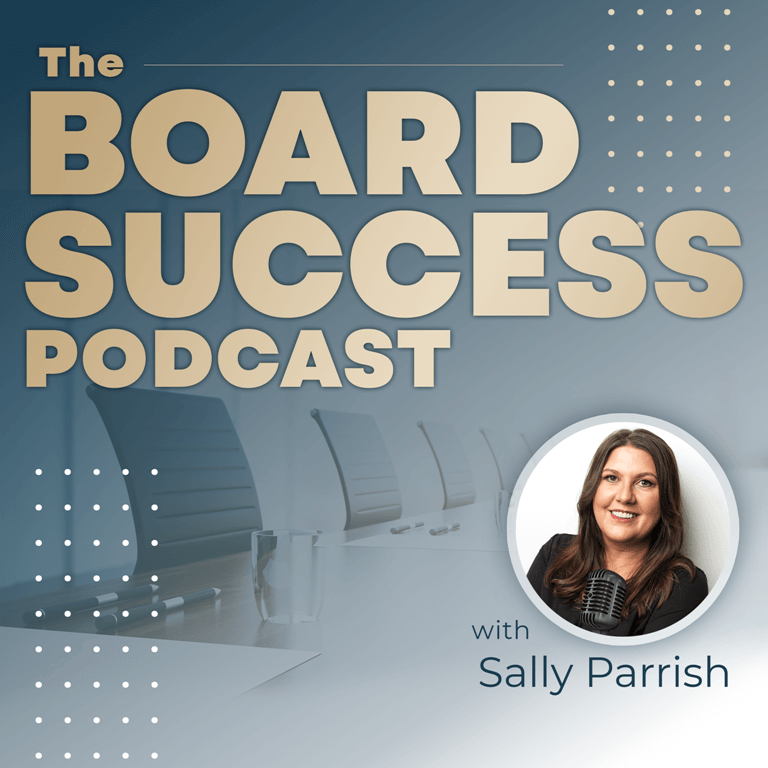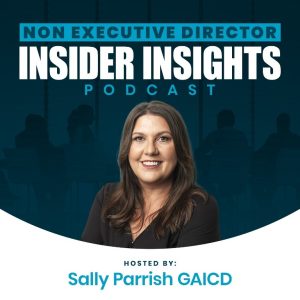An Interview with Richard Elstone
Sally Parrish interviews Board Interview Coach Richard Elstone
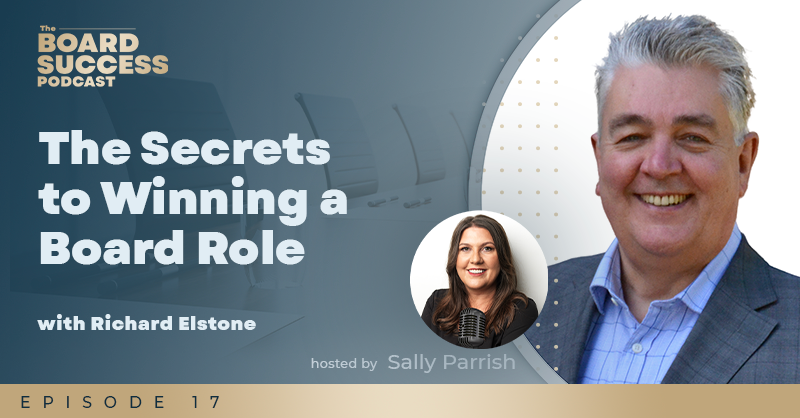
Board Interview Coach and founder of 'Executive Interview Coaching' joins us to share his advice for preparing for and winning the board interview.
Interviewing for the board role not only provides you with an opportunity to showcase your skills and experience, it also offers you a chance to demonstrate your board traits, such as asking great questions, being curious and being a succinct communicator.
In this episode, we explore some of the techniques Richard has been using with his clients to formulate great questions that impress in board interviewers. He also shares how you can improve your question technique and how to avoid interrogational or operational type questions.
Join us for some practical strategies including the best way to deal with the dreaded "Tell us about yourself" opening question.
FURTHER INFORMATION
Find Richard on Linkedin: https://www.linkedin.com/in/richardelstone/
Read the 'Are You Too Hands On To Be A n Effective Board Member' article mentioned in the podcast: https://www.executiveinterviewcoaching.com.au/post/are-you-too-hands-on-to-be-an-effective-board-member
Take the Executive Scorecard Assessment: https://non-executivechecklist.scoreapp.com/
Interview Executive Coaching Website: http://www.executiveinterviewcoaching.com.au
Click Here to View the Podcast Interview Transcript with Richard Elstone
Richard Elstone snippet (00:00):
Asking questions in a Board interview goes to the very heart of what it is that you've been hired to do. That is what you are there in the boardroom for is your ability to ask questions they want to hear about how you prosecute your experience through asking questions, you need to have two to three pages and none of them can be why questions.
Sally Parrish Intro (00:25):
Hi, I'm Sally Parrish, Amazon, Best Selling Author of the Essential Field Guide for Company Directors and founder of the Board Coaching Institute. I've been in on and around boards for over 20 years. And if you like me are passionate about the boardroom, then this podcast is for you. And I'd love you to join me on this mission to decode board success. What is it that sets some non executive directors apart from the rest? How can you enhance your leadership skills so you can be highly effective in the boardroom? And what will it take to make board success reality for you. I hope you enjoy these episodes as much as I love making them and that they unlock the secrets for you to gain a competitive advantage and have massive impact and influence in your board roles. Let's get started.
Sally Parrish (01:25):
Joining us today is my great friend Richard Elstone. He's the principal and director of Executive Interview Coaching and in addition to coaching, he's also a Partner with executive search firm Amrop Carmichael Fisher. Throughout his career, Richard has acted as a trusted advisor to Boards, CEOs and their executive teams in their search for hiring the very best talent across ASX listed, Private Equity backed and Private companies across Australia. With over 30 years’ executive search experience and coaching clients from around Australia, New Zealand, SE Asia and North America, Richard is the person you want on your team when you start thinking of making a career change during the executive interview process. He will give you the confidence and tools you need to perform your best in every executive and non-executive interview.
And that's the topic of today's podcasts. We're going to talk about nailing that Board interview. Richard, welcome. I've been waiting to do this podcast episode for a long long time. Thanks for joining us today.
Richard Elstone (02:30):
Well, thank you for having me Sally, it's really great to be here.
Sally Parrish (02:34):
The interviews you do, you're helping execs land executive roles, and non Executive Director roles. And of course, they're very, very different. How do you manage having a foot in both camps?
Richard Elstone (02:50):
I think it's that 30 years of experience and being able to bring that to bear really. As an executive, you're there as a subject matter expert, and you're there to look at how the organisation will grow and your contribution towards that.
As a non executive, you own the strategy of the organisation. And you're basically working there on behalf of the shareholders. So basically there, you're ensuring that the company is actually doing the right thing by the shareholders, by any regulators, etc. So it's a very, very different role. And it's all around governance and risk and managing and looking after the shareholders.
Sally Parrish (03:34):
Yeah, and I think if we can do one thing, well, today, that would be to help listeners really understand that difference between exec and non exec director, because understanding that will help to write the board resume, you know, how often have you seen a board resume where they've more or less crossed out executive CV and just change the title, right, and this is my board resume.
So understanding that difference will help to write resumes. But it's also really going to go a long way in terms of preparing and executing in that board interview. So it gets a lot of what we're talking about today is that directors mindset, right?
Richard Elstone (04:13):
The Directors mindset, which is very, very different indeed. And as you know, at the end of the day, in the boardroom, you're there primarily Sally to ask questions, and to use your ability to ask questions to derive influence rather than tell people what to do.
Sally Parrish (04:31):
Asking the right questions about the right things and asking questions well. That’s a really nice segue into questions in the Board interview process, right? I'll tell you the one that grinds my gears. You get an exec come in. It doesn't matter if it's an executive interview or Non Executive Director interview. They know the questions come in.
Every interview starts with it. It might be worded differently. But the question is, tell us a bit about yourself, what's your story? Or what brings you here? And is that opener, right? It's that over to you. And it's probably the question that people prepare least for, they're so busy thinking about their successes and to explain why they're a good fit for the role that they completely overlooked that really important introduction, you know, you've seen it, I've seen it, it's, Oh, what, what do you want to know? or what have you seen in that circumstance?
Richard Elstone (05:31):
Oh, probably the worst thing you can say back is, “so where do you want me to start?” I mean, at the end of the day, you know, this falls over to you, you should have this question prepared and nailed. And it needs to be relevant for the role, it's really your initial pitch for why you should be there in the interview, it's incredibly important to make sure that your answer is completely relevant to the role. What can happen is if it's answered really well, the whole interview can actually almost stop and it becomes then a discussion about, well, you've got exactly the credentials we're looking for here.
Let's tell you about what's happening with our business and see if you can help us. The amount of interviews that turn into discussions, if that question is answered well, doesn't happen very often, but when it does, it's probably the best of the interviews, I had somebody very recently. That's exactly happened to, they had a list of 10 questions that they were needed to prepare for. They answered the first one really? Well, it ended up being a business discussion.
Sally Parrish (06:40):
Yeah, and that's what the board is looking for anyone that's, you know, and anyone listening has been on that hiring inside of the table, right? So we're not talking to anyone that hasn't actually hired people themselves.
But you know, when you're hiring, when you're going through that selection process, you're hoping that that candidate is the right candidate, right, you're willing them to be the right candidate, you don't want to look at another 99 people, you're hoping you found that person! It is such a relief, when that person comes in, and you're singing off the same hymn sheet and you're all aligned.
And that doesn't happen by magic, right? What are your tips for getting that “pitch”, as you call it, right, that initial, tell us about yourself.
Richard Elstone (07:24):
So there's a couple of things here, the first thing I would say is, you could do it two different ways. And you and I discussed this before our discussion just now. So the first way is, tell them who you are. And then tell them how you got there.
And maybe two or three clear examples about how you got there. But do it chronologically. What you don't want to do is you don't want to work backwards from today, working backwards, it doesn't make any sense. And the other way of doing it is your way of doing it, Sally, which is I landed in Australia in 2000 with three suitcases and go from there, which is we know we're in for a story when that happens. And it really is telling a story.
And it's your story. And if you've got a couple of people that are key characters in that story about who are pivotal, put them into that story, it just helps sort of bring it to life a bit. I always think that it should be no longer than if you're trying to tell a young kid a story about a Little Red Riding Hood or something like that. So three to five minutes.
That's about the length it should be. And it should be compelling. And after all, it's your selling pitch. It's your pitch to why you're in the room, and why you should be considered.
Sally Parrish (08:40):
So if we aliken this to Shark Tank, right one of my favourite programs, when they come on and they pitch and you can see you know, these are real Aussie battlers, and they've really come from behind. If you're already in love with those characters, you're more inclined to love their product, right?
And there's no difference here. If you build a story that people can relate to, where they enjoy listening to that story. It's compelling, like you say, there's more likelihood that they can be more receptive to who you are and what you do. We know. We're humans, we're full of bias, right? We're going to lean in and we're, we're going to have confirmation bias where we're proving that that's the right person for this role, because that's what we're now looking for. Right?
Whereas if you make a bad start, we're looking for proof that you're not the right person, for the role as well. So in terms of your pitch, you're saying, either, ideally, I reckon start with a moment in time. I don't know a story that's not compelling that starts with, it started when I was eight years old, or when I was a kid, my dad used to, you know, we're all lean in and when we hear those stories.
What are your thoughts on maybe the things that haven't gone so well in your career? Would you put them in your pitch because from my point of view, I think we learn more from the things that haven't gone well than we have from the things that haven’t gone well.
So if you had something in your past and your resume, maybe you work for a company that folded or something like that, would you address that in your pitch, and then talk to what you learned from it,
Richard Elstone (10:25):
Always think that there's an elephant in the room it's a great opportunity to deal with it upfront, in that, tell me about yourself. So definitely do that if you can. Some people hope against hope that they don't have to deal with the elephant in the room, and you can bet on your dollar Sally that the question is gonna come up.
So better deal with it on your terms, rather than feel that you're going to be defensive. Deal with it on your terms. I practise this a lot with my coachees, dealing with it.
Oh, you know, what am I going to say? You know, when I left the company after six months? Well, you know, what was the reason? Well you know, it was a clash of cultures, and that just feels a bit weak? I said, No, it doesn't, you know, at the end of the day, as if it doesn't feel right, it doesn't feel right. And it probably goes more to your integrity.
And you as a person that you made that decision and made that call, then hoping it doesn't come up. So you then feel defensive about dealing with that issue or problem. So I think that's incredibly important.
Sally Parrish (11:31):
Yeah, I've had in my work life, I've had a couple of really major brands or you know massive successes that have gone bad have folded after I've left. So while I was working there, they were these great entities. But on the resume now, they look a bit iffy, right, it looks like I'm a little bit cursed. Actually, it's like the kiss of death if I've worked there.
But you've got to work that in, right, you've got to say, and these were all really, really great brands. And I don't know why Richard, but for some reason, two to three years after I move away, they tend to fall apart. So you've got to kind of bring that forth right and try and paint that picture as best as you can.
Richard Elstone (12:16):
Absolutely. I can totally agree with that. As you and I've said before, you learn more sometimes from your failures than you do from your successes. Think of what sporting teams go through, they lose a World Cup final or they lose a crucial match.
And the following week or the following year, they don't want to do that again. And I've learned a lot about that. You can see it with elite teams. And you as a Non Executive Director, you're an elite non executive. And how did you get there, there's got to be some knocks and bumps along the way hasn’t there Sally?
Sally Parrish (12:51):
There has to be, right? And I would be wary about anyone I was interviewing that had this straight line to success, no bumps in the road, I'd think that they were polishing something up and hiding somewhere. I'd be very dubious.
Now as well as that initial question, tell us about yourself. The other thing that we not necessarily can expect, but we should instigate, it's an opportunity for us to ask questions ourselves, right? Everyone talks about this being a two way process.
But oftentimes when you throw to the candidate, and you say, you know, what questions would you like to ask? “Oh, I think you've pretty much covered all of it”. But asking questions is a really good opportunity to showcase the depth of your skills, your knowledge, your critical thinking, or what’s your guidance around, having questions prepared to ask in an interview?
Richard Elstone (13:51):
Asking questions in a board interview goes to the very heart of what it is that you've been hired to do. That is what you are there in the boardroom for is your ability to ask questions. I always said to the people that I coach, that they need to have two to three pages of questions.
I know someone that the Board interview with the chairman lasted five minutes, and he had two questions for the chairman. He asked those two questions to the chairman. And the chairman answered them. But the interview was over in 10 minutes.
And of course he didn't get the board role. The reason you're there, the reason the chairperson is asking you about your questions is they want to hear about how you prosecute your experience through asking questions. You need to have two to three pages and none of them Sally can be, “Why?” questions.
Sally Parrish (14:47):
Yeah, absolutely took us through that Richard.
Richard Elstone (14:51):
So why questions that tends to be an agenda that's behind a why question. Why did you make an internal CEO appointment, rather than probably a better way of asking the question to the Chairman, is, can you explain to me the hiring process for the new CEO?
Which would be a much better question, and there's no defensive information going to be coming from the chairperson? When they're answering that question. So avoid ‘why’ questions in the boardroom, not only in the interview, but in the boardroom, as well, really.
And it's good practice for you to ask ‘non-why’ questions in the Board interview. You elicit far more relevant information and don't forget, it's your ability to ask questions to influence. You don't tell a CEO what to do, you ask them a question about what, using your experience to influence their thinking so they come up with the idea, based upon your question.
Sally Parrish (16:06):
Yeah, and you know, people often get confused around questioning skills, and of course, coaching is a profession based on questions skills. Coaches don't know the answer, all we can do is ask great questions to help the people that we're coaching, think about the right outcomes for them, and to tap into the resources that they already have.
And that's very much the role you're describing there. So the board is not there, to tell the CEO or exec team what to do, they're there to set the strategy. And then they're there to provide a framework to get the best out of that team towards achieving that strategic outcome. So I love that you say, Don't ask why. I always think that not only does why make people feel a bit defensive when they're asking it, but it also gives the questioner an air of kind of superiority. And we never want that in the board space. Right?
We were among equals, and, you know, we share the power. So I think that's a really good thing to start implementing. I love your advice, start doing that now, before you get on the board, and doing it in your board interviews.
Now, when you say have “two to three pages of questions prepared”, you're not going to sit there and ask all of those right, you're just going to have some questions that you can weave in authentically through the conversations.
Richard Elstone (17:31):
Exactly. But I always get my coachees for want of a better example, to prepare two to three pages of questions. And we'll tend to group them together and improve them. We want it down to about probably about a page or page and a half of questions.
But one thing you don't want to do, Sally is run out of questions. Like that's probably the worst thing that a non executive director can do is to run out of questions, and it shows that you're not curious, and let's be absolutely frank here, it's your ability to be curious and ask those tough questions that the reason that you're being hired as non executive director in the first place.
So if you don't have enough questions, how can you possibly be considered to be a potential board person for that particular organisation?
Sally Parrish (18:21):
And I've heard from clients that if you've done the work on understanding your value proposition, so what is it that I bring to the table, and you've done your work in terms of having great questions to ask, the process actually becomes enjoyable? I mean, you alluded to it earlier, right? It becomes almost like a conversation, a discussion piece, rather than an interrogation . It's kind of, how would that fit here? And what do you do, and it's kind of, there's a really nice flow to the interview, when the candidate knows what they're here to bring. And they have great questions for checking the environmentals around that thing that they want to bring.
So can we go to a few examples maybe ? So if my board value proposition was around, I mean, let's talk cyber, it's very topical right now, if I've got cyber expertise, that's what I'm bringing to the board as part of a broader board value proposition. What types of questions might you ask around cyber that demonstrate your ability in that space and your curiosity of what this business is doing right now?
Richard Elstone (19:37):
So you can ask, you know, sort of general questions. What's the board's understanding of the cybersecurity defence or strategies that are in place with that organisation? Have there been any attempts at any breaches within the organisation? What's the board cyber plan, if there is a breach, loads and loads and loads of questions around that? Again, make sure that none of the questions are judgmental.
Sally Parrish (20:07):
Seek to understand yeah yeah
Richard Elstone (20:11):
Because you’re there to seek to understand .
And the chair might turn around, say, well, that's why you're here, you need to give us some advice about, you know, what we should be doing, you need to be careful that, you know, you don't want to overstep your mark, though, and start to go into the operational side. Because at the end of the day, you need to question then whether the board need oversight on cybersecurity, or do they actually need some expertise at the executive level?
Sally Parrish (20:36):
So as a board member, what would make you sleep better at night, in terms of how you're managing cyber right now? It's a good open question that gets that conversation going, you know, this is what makes us nervous. This is what we're confident we're doing well, is there a line?
Because obviously, there's a lot of confidential information here, right? A lot of boards have company sensitive information, how do you manage that line between being curious and gathering information and checking you're a good fit with not encroaching too much on what might be company sensitive information.
Richard Elstone (21:17):
So there's only so much information that you can gather, in a board interview, at the end of the day, the chair is wanting to hear your ability to ask questions and see whether you potentially are a good fit, I think is part of the due diligence.
So you're now being considered you're one of the top one or two non executive directors and you're being considered for this particular board role, you now need to do your due diligence, and you want to see, they'll probably the last one or two board packs, and you might need to sign an NDA to do that. And buyer beware, caveat emptor on this one. If the board packs have any sort of weight that weighs more than 300 grams, you need to need to start thinking whether this is the board that you want to be on, it's called Snow, you know, they have a big board pack gets delivered a week before board meeting, and there's 250 pages and additional reading material, there's something that their company is trying to hide.
If, on the other hand, the board paper is 25 pages. And you know, it contains a lot of information. It's probably enough. If it's, as I said, if it's hundreds of pages, this is potentially is a big problem, there won't be enough time to do your due diligence.
Sally Parrish (22:45):
Yeah, I agree. And that tells you a lot about a board as well, you know, if they're board packs go out regularly two weeks before the meeting, and nothing is ever added after that day, that can tell you a lot about how this board works. If the board packs go out at different dates during the month. And there's additional information coming through all the time. It's gonna give you a lot of clues there.
Now, I'm just piggybacking off of you mentioning in due diligence there because what I see wrong is candidates going in for these interviews with a list of due diligence questions that's very different to the questions you're talking about. You're talking about questions to explore the business and whether we're a good fit and demonstrate your great questioning skills. I'm talking about. Here's my 30 things on my due diligence checklist that I want to know.
And we don't want you taking that into an interview, right, there's plenty of opportunities to do due diligence. One is before you even apply for the role, there's a lot of due diligence you can do before you even put your hat in the ring. There's a lot of due diligence you can do after you've been offered the role. So that's when you're more likely to get access to this sensitive information.
And I think you've got to be careful about the due diligence type questions you're asking in the interview. Now, obviously, we want to know, you know is the company financially sound, are there any legal challenges, we want to know all of that, but you really don't want to waste your interview time asking stock standard questions like that, that every other candidate is going to ask.
You've either got to do that before or after, I think and clear that space to ask really great questions about the role, right?
Richard Elstone (24:29):
About the role, but about the business and the business’s strategy. You know, where is the organisation in five years time? Where's the organisation going? ask all those questions. Do you need to be curious.
You want to join an organisation that's got sound governance and a sound strategy moving forward? I mean, it might be that you're there to be there as chair of the audit and risk committee. I mean, if that's the case, there might be some questions around bank covenants or Treasury or debt? Or, you know, what's the view from the chair of the risk profile for the organisation, etc?
These are the types of questions you're able to ask in a Board interview. They're general questions. But if you ask them openly, you can do a fair bit of due diligence within the Board interview process.
Sally Parrish (25:22):
Yeah, I love that. Let me ask you about red flags, Richard, and both, you know, red flags that the candidate might see during the interview and red flags that the interviewer might see of a candidate, what are some of those big no no or red flags that you see come up?
Richard Elstone (25:42):
Well, have a look at the board profile. So as you're doing your due diligence, before the interview, go and have a look at, there's some readily available information about who your non-executive directors are, on the board, have a look at it, have a look at the profile.
If it's 80%, male 20% female, then there's potentially a red flag. But if you're a female, there, you might even feel like you're the token female. So think about that. Also have a look at the profiles of the non-executive directors if it feels a little bit like an old boys club, unless there's a genuine feeling that the chair wants to change that. And it's not interesting for you, don't go for that board role.
As I said to you before, at the tail end of the process, have a look at some of those board packs. If they're too big and thick. You know, Houston, we have a problem is what I like Yeah,
Sally Parrish (26:43):
Yeah Or you might be the sort of person that likes that level of detail and complexity rather than that might be joyful for you. But for the majority of us, we want succinct information, we want to be decision making off of, you know, adequate information, but not ample information. Yeah, but you're right, if it walks like a duck quacks like a duck, right? It probably is.
Richard Elstone (27:07):
And then I think a candidate needs to clearly understand why they are potentially a good fit for that organisation. If the company doesn't really know what they're looking for in their new non-executive directors, then I think that can lead to maybe an unbalanced board or one that doesn't clearly reflect the strategy. And I think that's another red flag. To be honest, I think that's definitely a red flag.
Sally Parrish (27:36):
Yeah, we still send a lot of board vacancies now that want, you know, people with governance experience and strategic oversight. And that should be a given, right, we're looking for a particular expertise to navigate a particular area of our strategy. And it should be much more kind of focused on a skill or competence or an experience rather than that broad brush, kind of non Executive Director description that we always see.
Richard Elstone (28:03):
I think that a board should reflect two things, the chair needs to have an X chief executive from within the industry, there needs to be a finance person, CFO on the board. And I think there probably needs to be somebody around risk, or maybe law on the board. That's the company as it is today.
So that’s that bit. And then there should be two or three other non executive directors, which are there to help prosecute the strategy moving forward. So for instance, if an organisation is moving into Asia, or they're looking to do lots of mergers and acquisitions, or they're looking to open up in New Zealand or something like that, then two or three of the other non-executives need to reflect experience in handling those type of things.
Or if there's a big transformation happening within the organisation, maybe one of the non-executive directors needs to be an organisational transformation expert to oversee that transformation. So sort of the as is and then the to be should be reflected. I do both.
Sally Parrish (29:21):
I think you're right like those legal and financial attributes will never go out of fashion on a board but we don't need a board smothered in them anymore. We need more variety, more diversity amongst the other, the other non executive directors there.
Richard, that's been really insightful today. There's a lot of good tips there. Know your story, make sure you know how to start your interview by giving your pitch, have some questions prepared to demonstrate that you, you know you ask great questions and you understand what board life is all about.
Don't be asking operational questions. Make sure that they’re board level questions and that you're seeking to understand and really looking to see if you're a great fit for that role as much as they're looking to see if you're a great fit for that role.
Now Richard, you've got lots of resources on your website, what's your website address for anyone listening today?
Richard Elstone (30:21):
So www.executiveinterviewcoaching.com.au And on there, there's a big blog section. There's loads of material there that talks about interview questions, and, and lots of mini podcasts that cover all sorts of things from executive presence to what boards are looking for. So yeah, there's a lot of resources on my website.
Sally Parrish (30:48):
And I will put a link to that in the show notes for anyone who's driving and can't take a note right now. But www.executiveinterviewcoaching.com.au I will just bring your attention to one article on that website that you should check out.
The heading is “Are you ready for the boardroom?” And within that article, all the questions that you might expect in a Board interview that we perhaps haven't had time to cover today. So we'll put a note to that in the show notes.
And Richard, if anyone's interested in working with you and getting your help to prepare them for a particular upcoming interview? How can they get in touch with you?
Richard Elstone (31:35):
Well, they can do that via the website. Also, there's a link on the website to my diary for a zoom catch up. And there’s also on the website, there is a link to my brochures as well. And they're also able to conduct if they are interested, take our non executive checklist as well.l
Sally Parrish (31:54):
Richard, thank you so much for joining us today. We could talk Interview Questions forever, and we often do so I'm sure you'd be back again on the podcast in the future to talk about some other examples for preparing for non Executive Director interviews. Thank you for joining us today, Richard.
Richard Elstone (32:12):
Thank you, Sally. It's been fantastic to chat with you today.
Sally Parrish (32:21):
Thanks very much for tuning in. I'd love to know what you thought of this episode and what you took away from it. I'd also love to know what topics you're interested in hearing about in the future, and which experts you think should be featured on this Board Success Podcast.
If you enjoyed listening, please share with your colleagues who might also have an interest and make sure you click to follow or subscribe to be advised about upcoming episodes. In the meantime, if you're a leader or a successful executive, and you're looking to launch your board career, or if you're an established non Executive Director and you're ready for the next level, check out the resources we have available for you on the website at boardcoachinginstitute.com.au. Until next time, here's to your board success.
Explore more episodes
